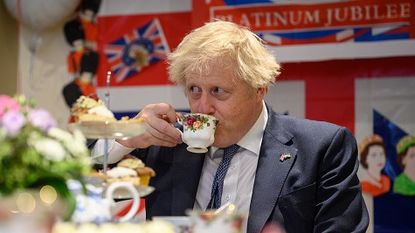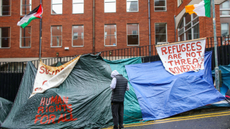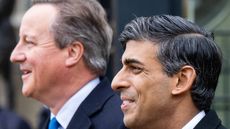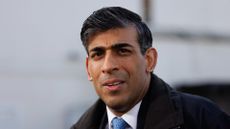How does a no-confidence vote work?
Johnson will face a decision on his leadership later today

Conservative MPs will vote on whether to allow Boris Johnson to continue as their leader after at least 54 letters of no confidence were sent to 1922 Committee chair, Graham Brady.
Brady published a statement this morning announcing that the threshold of 15% of the parliamentary party seeking a vote of confidence in Johnson had been “exceeded”, and that a poll will take place this evening from 6-8pm. A result will then be announced “shortly thereafter” said Brady.
According to PoliticsHome, Johnson had been told on Sunday that the threshold for a vote had been passed, and that he and Brady had then “agreed a timetable for holding the vote”.
Subscribe to The Week
Escape your echo chamber. Get the facts behind the news, plus analysis from multiple perspectives.

Sign up for The Week's Free Newsletters
From our morning news briefing to a weekly Good News Newsletter, get the best of The Week delivered directly to your inbox.
From our morning news briefing to a weekly Good News Newsletter, get the best of The Week delivered directly to your inbox.
A No. 10 spokesperson said that Johnson welcomed the vote as an opportunity to “draw a line” under weeks of speculation over his ability to carry out the top job.
“Tonight is a chance to end months of speculation and allow the government to draw a line and move on, delivering on the people’s priorities,” said the spokesperson.
“The PM welcomes the opportunity to make his case to MPs and will remind them that when they’re united and focused on the issues that matter to voters there is no more formidable political force.”
The vote
In the Conservative Party, a no-confidence vote is triggered if 15% of the party’s MPs – currently 54 of the 359 Tory MPs in the current government – write to Sir Graham Brady, the chair of the 1922 Committee, to request the move. Under new rules introduced at Christmas, MPs no longer need to “physically hand” letters over to Brady and can instead email them to him.
Only Brady knows how many letters have been sent, keeping a secret tally until the threshold is reached. Although it is not yet known exactly how many MPs submitted letters of no confidence, Insider said that sources thought “more than 60 had done so”.
Under party rules, only a simple majority is needed for the PM to hold on to the top job – but he would be ousted if more than half of MPs voted against him. The magic number for Johnson to keep his job in the event of a confidence vote is 180.
If he were to survive the vote, another no-confidence vote could not be held against him for at least another year. If he did not, a leadership contest would be triggered, in which Johnson would not be able to stand.
A long list of Tory contenders would be whittled down by MPs to just two, before the 100,000-strong Conservative Party membership hold a one-member-one-vote election to pick their new leader – who would also become the next PM of the United Kingdom.
When will the vote take place, now the threshold has been met?
According to The Guardian, Brady was asked by reporters this morning when the threshold was reached, which he said was complicated by some MPs specifying that their letter should only be “effective from the end of the Platinum Jubilee celebrations”.
As Brady announced this morning, the vote will take place from 6-8pm on Monday evening.
The chair of the 1922 Committee is afforded a “certain amount of discretion” over exactly when a vote will take place, but in his role is expected to tell the prime minister when the threshold has been reached and then organise a confidence vote “as soon as practicable”, according to The Guardian.
A ballot box will be placed in the 1922 Committee room at the time of the vote, and Conservative MPs will vote in a secret ballot.
How likely is Johnson to survive a confidence vote?
While it is “relatively easy to see” how rebel Conservative MPs could whip up enough support for 54 letters to be submitted to the 1922 Committee, triggering a confidence vote, it is “much harder to see” how they would reach the 180 votes needed to oust Johnson in such an event, writes The Times’s associate political editor Henry Zeffman.
The prime minister is likely to muster at least 140 votes from MPs on the government “payroll” – that is Cabinet ministers, junior ministers, and parliamentary private secretaries – and so it looks “much likelier that Johnson will win but suffer the indignity of a large chunk of his own MPs visibly turning against him.”
If Johnson was able to secure a majority in the event of a no-confidence vote this would theoretically grant him immunity from further challenges to his leadership for another year, “potentially giving him time to steady the ship, rebuild alliances and strengthen his grip over the parliamentary party”, said The Independent.
But in reality, Johnson may find himself “unable to survive that period politically”, said the paper, which noted that Theresa May was only able to hang on a number of months after “emerging victorious from a confidence vote”. Six months later, she “announced her resignation outside No. 10”.
Create an account with the same email registered to your subscription to unlock access.
Sign up for Today's Best Articles in your inbox
A free daily email with the biggest news stories of the day – and the best features from TheWeek.com
Sorcha Bradley is a writer at The Week and a regular on “The Week Unwrapped” podcast. She worked at The Week magazine for a year and a half before taking up her current role with the digital team, where she mostly covers UK current affairs and politics. Before joining The Week, Sorcha worked at slow-news start-up Tortoise Media. She has also written for Sky News, The Sunday Times, the London Evening Standard and Grazia magazine, among other publications. She has a master’s in newspaper journalism from City, University of London, where she specialised in political journalism.
-
 5 high-caliber cartoons about Kristi Noem shooting her puppy
5 high-caliber cartoons about Kristi Noem shooting her puppyCartoons Artists take on the rainbow bridge, a farm upstate, and more
By The Week US Published
-
 The Week Unwrapped: Why is the world running low on blood?
The Week Unwrapped: Why is the world running low on blood?Podcast Scientists believe universal donor blood is within reach – plus, the row over an immersive D-Day simulation, and an Ozempic faux pas
By The Week Staff Published
-
 Rishi Sunak's asylum spat with Ireland explained
Rishi Sunak's asylum spat with Ireland explainedIn Depth Irish government plans to override court ruling that the UK is unsafe for asylum seekers
By The Week UK Published
-
 Is David Cameron overshadowing Rishi Sunak?
Is David Cameron overshadowing Rishi Sunak?Talking Point Current PM faces 'thorny dilemma' as predecessor enjoys return to world stage
By The Week UK Published
-
 Less than total recall
Less than total recallEditor's Letter Why our brains want to forget the darkest days of the pandemic
By Theunis Bates Published
-
 'A wonky bureaucratic tweak has dramatically changed how Americans drive'
'A wonky bureaucratic tweak has dramatically changed how Americans drive'Instant Opinion Opinion, comment and editorials of the day
By Harold Maass, The Week US Published
-
 Will Aukus pact survive a second Trump presidency?
Will Aukus pact survive a second Trump presidency?Today's Big Question US, UK and Australia seek to expand 'game-changer' defence partnership ahead of Republican's possible return to White House
By Sorcha Bradley, The Week UK Published
-
 Can Boris Johnson save Rishi Sunak?
Can Boris Johnson save Rishi Sunak?Today's Big Question Former PM could 'make the difference' between losing the next election and annihilation
By The Week UK Published
-
 It's the economy, Sunak: has 'Rishession' halted Tory fightback?
It's the economy, Sunak: has 'Rishession' halted Tory fightback?Today's Big Question PM's pledge to deliver economic growth is 'in tatters' as stagnation and falling living standards threaten Tory election wipeout
By Harriet Marsden, The Week UK Published
-
 Why your local council may be going bust
Why your local council may be going bustThe Explainer Across England, local councils are suffering from grave financial problems
By The Week UK Published
-
 Rishi Sunak and the right-wing press: heading for divorce?
Rishi Sunak and the right-wing press: heading for divorce?Talking Point The Telegraph launches 'assault' on PM just as many Tory MPs are contemplating losing their seats
By Keumars Afifi-Sabet, The Week UK Published